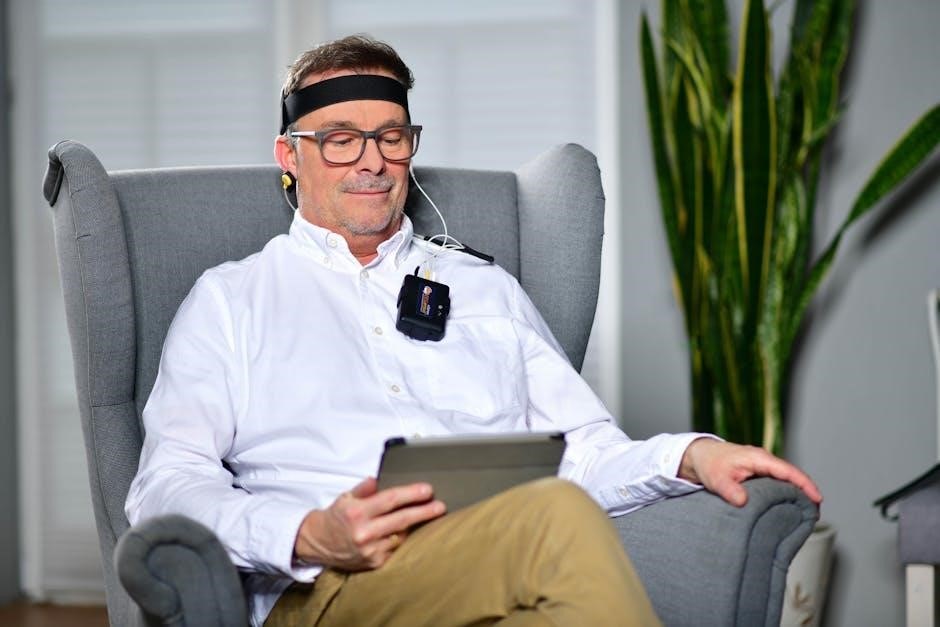Cognitive speech therapy focuses on improving communication and cognitive skills in adults with brain injuries or neurological conditions. Activities like word association, storytelling, and memory exercises enhance language processing, attention, and problem-solving abilities, tailored to individual needs and goals.
Overview of Cognitive Speech Therapy
Cognitive speech therapy is a specialized approach designed to address communication and cognitive challenges in adults, often resulting from brain injuries, strokes, or neurological disorders. It focuses on enhancing memory, attention, problem-solving, and executive functions to improve daily communication. Activities such as Response-Elaboration Training (RET), naming therapy, and spaced retrieval are commonly used to strengthen language processing and recall. These interventions are personalized to meet individual needs, ensuring practical and functional outcomes. The therapy also incorporates low-prep resources, digital tools, and traditional methods like board games and puzzles to engage patients effectively. By targeting cognitive-communication disorders, this therapy helps adults regain independence and confidence in their ability to interact and participate in social activities.
Importance of Cognitive Rehabilitation in Adults
Cognitive rehabilitation is essential for adults facing communication and cognitive challenges due to brain injuries, strokes, or neurological conditions. It plays a crucial role in restoring independence, enhancing quality of life, and improving social interaction. By addressing memory, attention, and executive function deficits, cognitive rehabilitation helps adults regain skills necessary for daily tasks and relationships. Tailored activities, such as word association and storytelling, promote language recovery and problem-solving abilities. Early intervention and consistent practice can significantly improve long-term outcomes, enabling adults to reintegrate into their communities and maintain a fulfilling lifestyle. This therapy is vital for supporting adults in overcoming cognitive-communication barriers and achieving personal goals.

Key Concepts in Cognitive Speech Therapy
Cognitive speech therapy focuses on enhancing communication and problem-solving skills through activities like RET, naming exercises, and memory strategies, tailored to address specific cognitive-communication challenges in adults.
Cognitive-Communication Disorders in Adults
Cognitive-communication disorders in adults often result from brain injuries, strokes, or neurological conditions, impacting memory, attention, and executive functions. These disorders can affect language processing, problem-solving, and social interaction. Symptoms may include difficulty with word retrieval, following conversations, or understanding complex instructions. Therapy activities like word association, storytelling, and task sequencing are designed to target these challenges. For instance, spaced retrieval enhances memory, while response-elaboration training improves verbal expression. These interventions help adults regain communication skills and independence. Resources such as workbooks and online platforms provide structured exercises to support rehabilitation. Personalized approaches ensure activities align with individual needs and goals, fostering meaningful progress in cognitive and communication abilities.
Role of Memory, Attention, and Executive Functions
Memory, attention, and executive functions are crucial for effective communication in adults. Memory supports word retrieval and following conversations, while attention helps focus during interactions. Executive functions enable planning, organizing, and adapting responses. Impairments in these areas can hinder communication but can be addressed through targeted activities. For example, spaced retrieval strengthens memory, and task sequencing improves problem-solving. Attention-enhancing exercises like YouTube videos or puzzles also play a role. Executive function tasks, such as planning and prioritizing, are often integrated into therapy. These cognitive skills are essential for daily tasks and social interactions, making them a cornerstone of cognitive speech therapy for adults. Activities are designed to enhance these abilities, promoting independence and confidence in communication.
Setting Realistic Goals for Therapy
Setting realistic goals is essential for effective cognitive speech therapy. Goals should be specific, measurable, and tailored to the individual’s needs and abilities. For adults, this often involves improving communication skills, memory, or problem-solving abilities. Using tools like visual planners or timers can help track progress and stay organized. Breaking larger goals into smaller, manageable steps ensures steady improvement. For example, starting with simple tasks like scheduling appointments or organizing information can build confidence. Celebrating milestones, no matter how small, motivates continued effort. Regular assessment and adjustment of goals ensure they remain relevant and achievable, fostering a positive and productive therapeutic experience. This structured approach helps adults stay focused and engaged in their cognitive rehabilitation journey.

Effective Cognitive Speech Therapy Activities
Cognitive speech therapy for adults involves diverse activities that enhance communication, memory, and problem-solving skills, tailored to individual needs and goals for optimal progress and engagement.
Response-Elaboration Training (RET)
Response-Elaboration Training (RET) is a widely used technique in cognitive speech therapy for adults. It involves prompting individuals to expand their verbal responses to specific questions or prompts. By encouraging detailed explanations, RET enhances expressive language skills, memory recall, and organizational abilities. This method is particularly effective for adults with cognitive-communication disorders, as it fosters confidence in communication. RET activities often include picture description tasks, narrative storytelling, and open-ended discussions. Over time, participants learn to articulate their thoughts more clearly and cohesively, improving both their speech and overall cognitive function. RET is a cornerstone in many speech therapy programs, offering measurable progress in communication skills.
Naming Therapy for Word Retrieval
Naming Therapy for Word Retrieval is a targeted approach in cognitive speech therapy, designed to assist adults in overcoming word-finding difficulties. This method is particularly beneficial for individuals with aphasia or cognitive-communication disorders. Techniques include picture naming, word repetition, and semantic exercises to stimulate lexical access. Activities often involve matching words to images or categorizing items to enhance retrieval skills. By practicing these exercises, adults improve their ability to recall and use specific vocabulary, fostering clearer and more effective communication. Naming Therapy not only boosts confidence but also enhances overall quality of life by facilitating everyday conversations and tasks.
Task Sequencing and Problem-Solving Exercises
Task sequencing and problem-solving exercises are essential components of cognitive speech therapy, helping adults improve their ability to organize and complete daily tasks. These activities focus on breaking down complex processes into manageable steps, enhancing executive function and memory. For example, activities may involve planning a meal, scheduling appointments, or organizing information. Problem-solving exercises encourage critical thinking and decision-making, such as solving puzzles or completing tasks with missing information. By practicing these skills, adults can better navigate real-life situations, improving their independence and confidence. These exercises are often tailored to individual needs, ensuring a personalized approach to cognitive and communication development.
Spaced Retrieval for Memory Enhancement
Spaced retrieval is a highly effective technique used in cognitive speech therapy to enhance memory retention and recall in adults. This method involves repeatedly practicing information at increasingly longer intervals, helping to transfer it from short-term to long-term memory; For example, a patient might practice recalling a word list initially after a few seconds, then minutes, and eventually days. This approach is particularly beneficial for individuals with memory impairments, such as those with aphasia or traumatic brain injuries. By gradually increasing the time between practice sessions, spaced retrieval strengthens memory pathways, improving the ability to remember important words, phrases, and concepts. Regular practice with this technique can significantly enhance communication and cognitive function over time.
Word Association and Storytelling
Word association and storytelling are powerful tools in cognitive speech therapy for adults, enhancing language processing and memory. Word association involves linking words to stimulate lexical retrieval and semantic processing, aiding individuals with aphasia or word-finding difficulties. Storytelling encourages narrative development, promoting sequential memory and coherence. These activities are often combined with visual aids or prompts to guide patients. For example, describing a life event or creating a short narrative fosters engagement and recall. Regular practice improves communication fluency and confidence, making these techniques adaptable to various cognitive levels. They are particularly effective for adults with brain injuries or neurological conditions, helping to rebuild language and memory skills in a structured yet creative manner.

Pattern Recognition and Problem Solving
Pattern recognition and problem-solving activities are essential in cognitive speech therapy for adults, targeting executive functions and critical thinking. These exercises, such as puzzles, Sudoku, and sequencing tasks, enhance the ability to identify patterns and logically resolve issues. Memory games, like matching pairs, also improve recall and concentration. Problem-solving exercises, such as planning daily tasks or organizing steps to complete a project, foster independence and adaptive thinking. These activities are often tailored to the individual’s cognitive level, making them accessible and effective for adults with varying degrees of impairment. By stimulating these skills, patients can better navigate real-life situations, improving their overall cognitive and communication abilities in a practical and engaging way.

Digital and Traditional Tools for Therapy
Digital tools such as AI apps and YouTube enhance cognitive-communication skills, while traditional resources like board games, card games, puzzles, and low-prep printables provide practical, engaging therapy options.
Low-Prep Printable Resources for SLPs
Low-prep printable resources are essential for speech-language pathologists (SLPs) to efficiently support adult cognitive speech therapy. These materials, often downloadable as PDFs, include word association exercises, storytelling templates, and memory-enhancing activities like word repetition and pattern recognition. Resources such as those found on Nicespeechlady.com offer handouts and therapy materials tailored for adults with cognitive-communication disorders. These printables are designed to be easy to prepare, saving time while providing structured exercises for improving attention, executive functions, and language processing. They often include goal-oriented tasks, such as organizing information or scheduling appointments, which align with real-world applications. Printable resources are a practical and effective way to integrate cognitive stimulation into daily therapy routines, ensuring consistent and engaging practice for adults.
Using YouTube for Attention and Memory
YouTube serves as a valuable tool in cognitive speech therapy for adults, offering diverse content to enhance attention and memory. Videos can be tailored to individual needs, providing engaging auditory and visual stimuli. For instance, short educational clips or how-to tutorials can improve focus and recall. Additionally, music-based exercises, such as following song lyrics or identifying melodies, can stimulate memory and language retrieval. Speech-language pathologists (SLPs) can utilize YouTube playlists to create structured sessions, incorporating timestamps and pauses to encourage active participation. This digital approach not only makes therapy dynamic but also accessible, allowing adults to practice cognitive skills in a familiar and motivating environment, thereby supporting their rehabilitation journey effectively.
Board Games, Card Games, and Puzzles
Board games, card games, and puzzles are excellent tools for cognitive speech therapy in adults, offering engaging ways to improve memory, attention, and problem-solving skills. Activities like Scrabble or Sudoku enhance word retrieval and executive functioning, while games such as Memory Match or Uno improve focus and processing speed. These low-prep resources are ideal for speech-language pathologists, as they provide structured yet enjoyable therapy sessions. Puzzles, such as crosswords or jigsaw puzzles, encourage critical thinking and sequencing abilities, which are essential for cognitive rehabilitation. These traditional tools also foster social interaction, making them versatile for addressing both individual and group therapy needs, while promoting overall cognitive and communication growth in adults.
AI-Driven Apps for Cognitive Rehabilitation
AI-driven apps are revolutionizing cognitive rehabilitation by offering personalized and interactive exercises for adults. Platforms like Constant Therapy Health provide tailored speech and cognitive exercises, enabling adults to practice memory, attention, and language skills at home. These apps use advanced algorithms to adapt to individual progress, ensuring challenging yet achievable goals. Features like real-time feedback and progress tracking enhance engagement and motivation. AI-driven tools also incorporate multimedia elements, such as videos and interactive games, to make therapy more engaging. By leveraging technology, these apps bridge the gap between clinical and home-based therapy, offering flexible and effective solutions for cognitive and communication rehabilitation in adults with diverse needs and abilities.

Case Studies and Practical Applications
Real-life examples demonstrate cognitive speech therapy’s effectiveness in improving communication and daily functioning. Practical strategies, such as task sequencing and memory exercises, enhance adults’ ability to engage in meaningful activities and interactions, supported by evidence-based tools and techniques.
Improving Social Activity Through Speech
Cognitive speech therapy plays a vital role in enhancing social interactions for adults with communication challenges. Activities such as word association, storytelling, and role-playing help improve conversational skills and confidence. These exercises encourage active listening, turn-taking, and appropriate responses, fostering meaningful connections. For instance, group activities like structured discussions or problem-solving tasks promote collaboration and social engagement. Additionally, techniques like scheduling appointments or organizing information aid in real-life communication scenarios, making social interactions more manageable and enjoyable. By addressing underlying cognitive and linguistic deficits, speech therapy empowers adults to participate fully in social settings, enriching their quality of life and relationships.
Using Visual Timers and Planners
Visual timers and planners are essential tools in cognitive speech therapy for adults, helping to improve time management and task completion. These tools provide clear, structured cues, reducing anxiety and enhancing focus. By breaking tasks into smaller, manageable steps, adults can better organize their thoughts and actions. Visual timers assist with pacing during conversations or activities, while planners help track appointments and daily goals. These strategies support executive function skills, such as planning and self-monitoring, which are often impacted in individuals with cognitive-communication disorders. Incorporating visual supports into therapy sessions and daily routines fosters independence and confidence, making them invaluable for long-term cognitive and communication growth.
Breaking Down Tasks for Better Completion
Breaking tasks into smaller, manageable steps is a cornerstone of cognitive speech therapy for adults. This approach simplifies complex activities, reducing overwhelm and enhancing focus. By creating clear, sequential steps, adults with cognitive-communication disorders can better navigate tasks like scheduling appointments or organizing information. Visual aids, such as checklists or flowcharts, further support comprehension and completion. This method not only improves executive function skills but also boosts confidence and independence. Therapists often incorporate this strategy into daily routines, ensuring tasks are achievable and aligned with individual goals. Breaking tasks down fosters a sense of accomplishment and progress, making it a vital tool in cognitive rehabilitation.

Cultural and Individual Considerations
Cultural and individual differences must be considered in cognitive speech therapy. Adapting activities to diverse populations ensures effective communication and addresses unique needs, fostering inclusivity and progress.
Adapting Activities for Diverse Populations
Adapting cognitive speech therapy activities for diverse populations ensures inclusivity and effectiveness. Cultural sensitivity is crucial, as communication styles and language backgrounds vary. Activities like word association and storytelling can be tailored to reflect individual experiences and preferences. For example, using familiar games or incorporating visual aids can enhance engagement for adults with diverse learning styles. Additionally, incorporating technology, such as AI-driven apps or YouTube videos, can cater to different cognitive levels and interests. Personalized approaches ensure that therapy meets unique needs, fostering meaningful progress and participation. By considering cultural, linguistic, and individual differences, therapists can create a supportive and inclusive environment for all adults. This adaptability is key to successful cognitive rehabilitation.
Personalizing Therapy for Individual Needs
Personalizing therapy for individual needs is essential for effective cognitive speech rehabilitation. Each adult’s cognitive and communication challenges are unique, requiring tailored approaches. Activities such as task sequencing and spaced retrieval can be modified to address specific deficits like memory or attention. For instance, using low-prep resources or digital tools like AI-driven apps allows therapists to customize exercises based on individual goals. Incorporating personal interests, such as hobbies or daily routines, enhances engagement and relevance. Regular assessments and adjustments ensure the therapy remains aligned with the adult’s progress and evolving needs. This personalized approach maximizes outcomes and empowers adults to achieve meaningful improvements in their communication and cognitive abilities, fostering independence and confidence.

Resources and Further Reading
Explore “The Adult Speech Therapy Workbook” by Chung Brewer for practical cognitive exercises. Visit NiceSpeechLady.com for free, customizable resources and therapy materials tailored for adults.
Recommended Workbooks for Adults
For adults engaging in cognitive speech therapy, workbooks like The Adult Speech Therapy Workbook by Chung Brewer are highly recommended. These resources provide structured exercises to improve memory, attention, and communication skills. Brewer’s workbook offers practical tasks tailored to individual needs, focusing on real-life applications. Additionally, Cognitive-Communication Disorders and Functional Cognitive Rehabilitation are excellent guides for adults seeking to enhance their cognitive and linguistic abilities. These workbooks include activities for word retrieval, problem-solving, and executive function development. They are ideal for speech-language pathologists (SLPs) and individuals looking to reinforce therapy goals independently. Using these workbooks can significantly support progress in cognitive speech therapy for adults.
Online Platforms for SLPs and Patients
Several online platforms offer valuable resources for speech-language pathologists (SLPs) and adults undergoing cognitive speech therapy. NiceSpeechLady.com provides free, downloadable materials, including handouts and therapy activities, designed to support cognitive-communication goals. Constant Therapy Health is another notable platform, offering AI-driven, personalized exercises for memory, attention, and language rehabilitation. Additionally, SpeechTherapyPD and LinguiSystems provide digital workbooks and interactive tools tailored for adult therapy. These platforms cater to diverse needs, ensuring accessible and engaging cognitive rehabilitation. They are particularly useful for remote therapy sessions and independent practice, aiding adults in achieving their communication and cognitive goals effectively.
